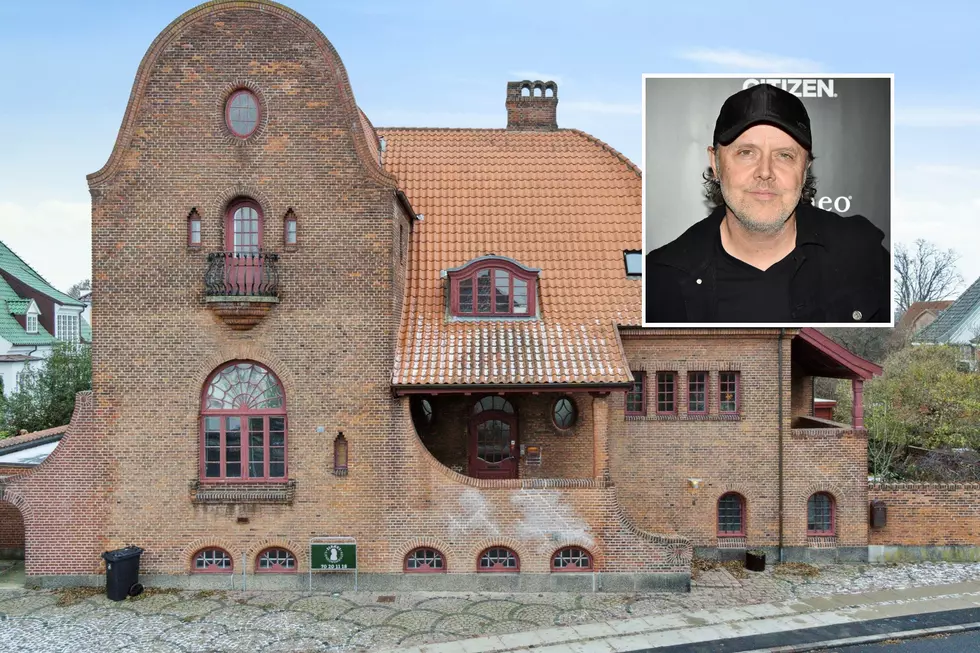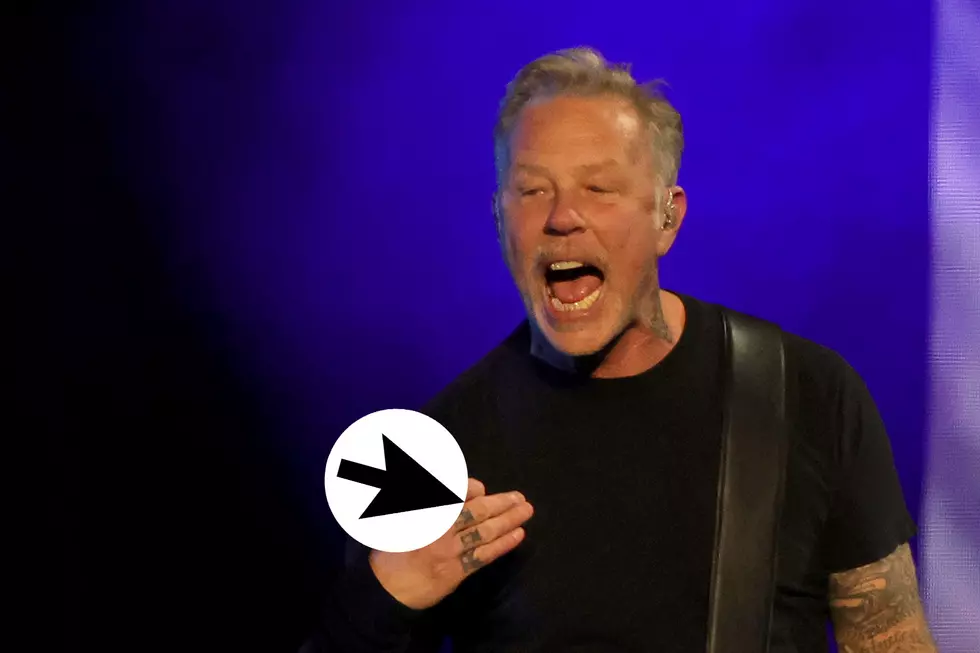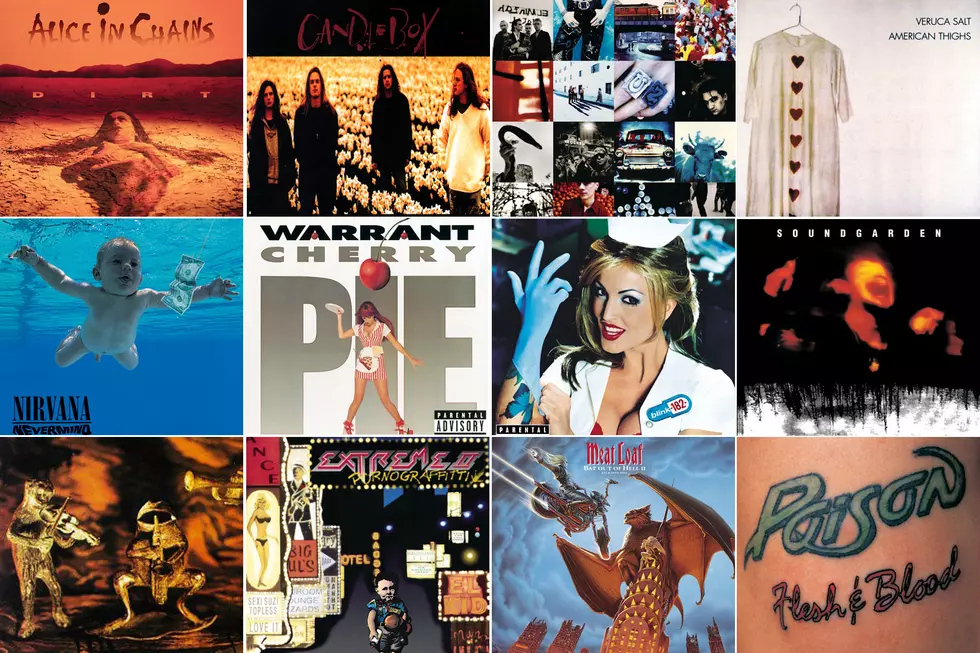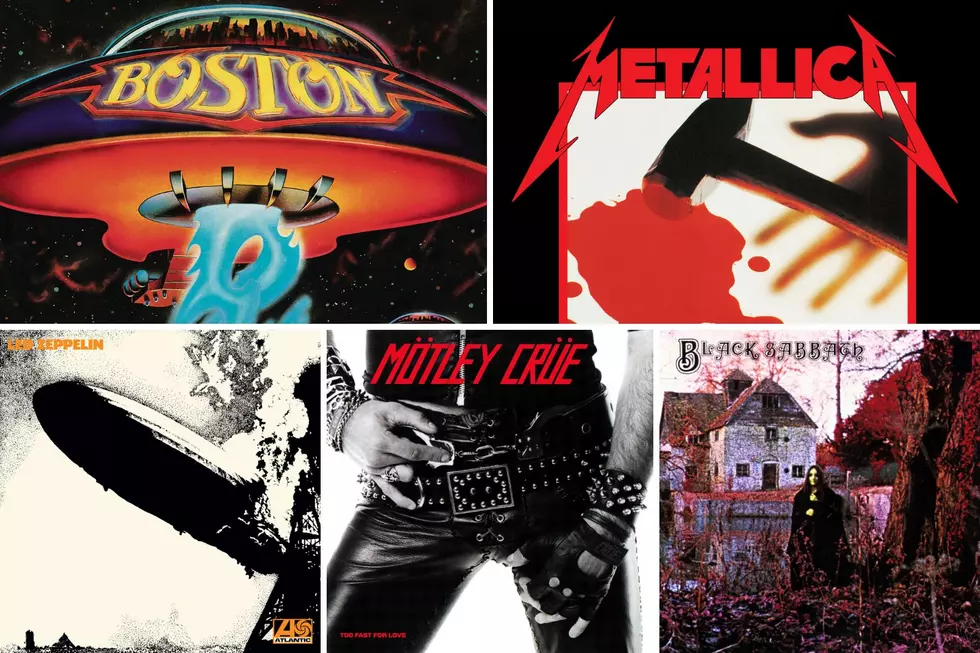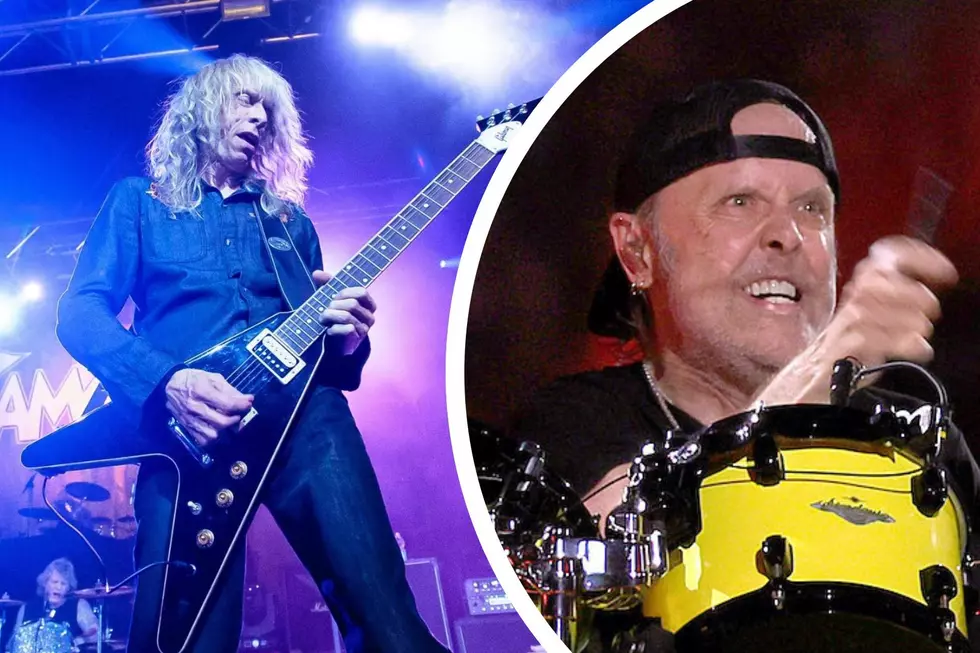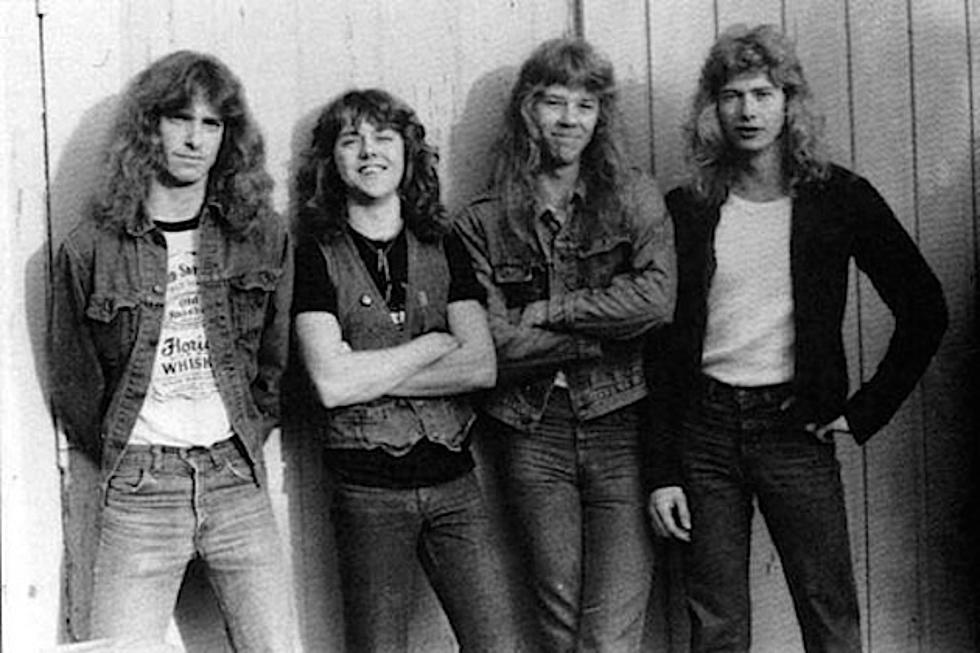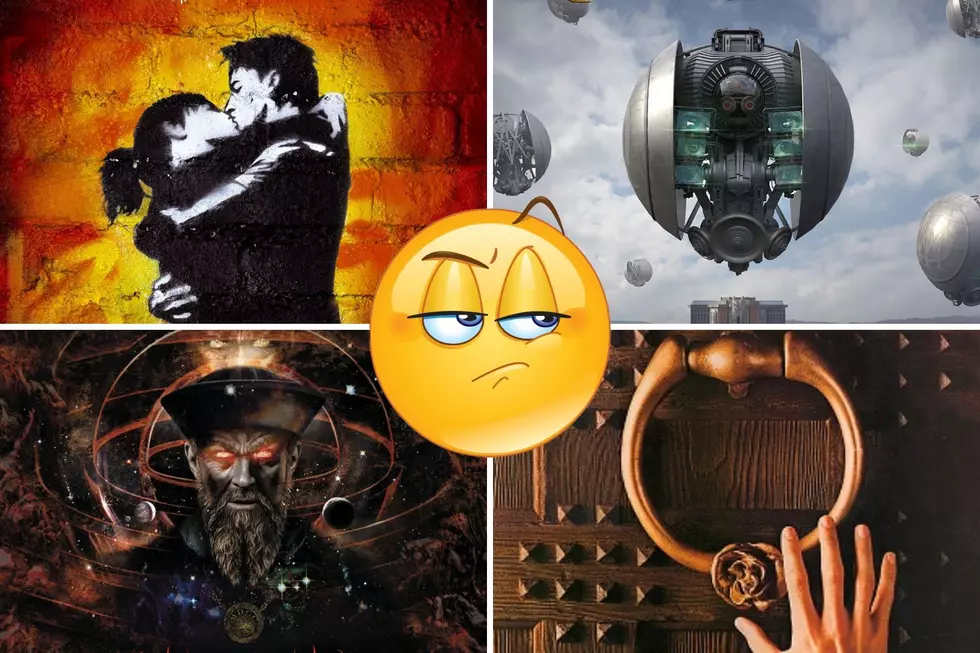![Metallica’s Kirk Hammett on Crafting ‘Hardwired’ Solos: ‘I Played Whatever Was in My Head’ [Interview]](http://townsquare.media/site/366/files/2016/12/Metallica-Kirk-Hammett.jpg?w=980&q=75)
Metallica’s Kirk Hammett on Crafting ‘Hardwired’ Solos: ‘I Played Whatever Was in My Head’ [Interview]
Kirk Hammett was the guest on Full Metal Jackie's radio show over the weekend. The Metallica guitarist discussed the band's new album, 'Hardwired ... To Self-Destruct,' recalled a scary situation at the Monsters of Rock concert in 1988 and talked about touring in support of the new disc over the next two years. Check out the conversation below:
Why, in your opinion, did it take eight years [for a new Metallica album]?
Well, I mean it’s because we have a tendency to over obligate. There were just so many things that kind of just popped up after we were through with the world behind Death Magnetic which took about two or three years. And we did an album with Lou Reed. We made a movie. We did a bunch of tours. Before we knew it, at that point, it had been six years since the release of Death Magnetic.
And that’s when we started getting the songs together for this album. It took two years, but by the end of it, by the time the album, came out, it had been eight years. And it’s funny because I was doing an interview earlier and I think the Beatles entire recording career was about eight years long. And, you know, it’s just like, what can I say?
Talking about eight years. There's eight years between Hardwired... To Self-Destruct and Death Magnetic — do you foresee a greater sense of urgency to record and release music quicker as you guys get older?
Well, I think we set a precedent here that I don’t think that we want to follow. I mean, eight years between albums, we could have avoided that if we worked on avoiding that. And so, I think at this point in time, I think the onus would be to put out albums in a more timely fashion.
Metallica is notorious for generating a lot of ideas for new music. What have you learned about creative enthusiasm and not getting overwhelmed by sorting through the sheer volume of ideas?
Boy, that’s a really, really great question, Jackie. I’ve been a musician for most of my life. I’ve been playing guitar for four decades now. And it seems that after a while you reach a point where the ideas flow. They come quickly or they don’t. After a time, you kind of get a backlog of ideas. And at that point, if you’ve been a working musician for a long time, one of the most difficult things to do is to be objective about your own work or subjective, whatever you need to be.
And a lot of times, it’s really difficult to ascertain what is better than something else musically. Because a lot of times when it comes from the same source, you kind of stamp everything with that same stamp of approval. And so, it helps when you have other band members around or you’re surrounded by producers or engineers, whatever, who tell you that’s a good piece of music, but that is not. I mean, it really helps.
Having said all that, I think that it’s pretty obvious when an idea comes on the floor and it’s instantly, alright this idea is way better than anything else we have. And it instantly just floats to the top.
You've been playing guitar for a long time and learning how to play guitar starts with emulating other players. When did you first start feeling comfortable that your own style was starting to emerge?
Maybe a couple of weeks ago. It’s funny because as a dedicated musician, as a dedicated guitar player, I pick up my guitar, I play day in and day out. I’m very conscious of what has happened before my time and what has happened during my time and what’s happened in the now.
I’m very conscious of how I fit into all of this. And my whole attitude has been pretty much the same, I’ll say, every since I started playing. Pick up your guitar. Work hard to improve yourself and grow and can be open to new things. Just try to be a sponge and filter in all the good stuff and try and keep out all the bad. I've been doing that pretty much my entire musical life, my entire musical career and just in keeping to know what sounds good to me instinctively. Never losing sight of what inspires me and who inspires me. What influences me and what does not influences me.
Through all that stuff, you know, every time I play guitar - it's the accumulation of all that stuff I just mentioned. When I play my guitar, that's me. That's my personality.
Concurrently, people have come up to me and said, "Kirk, you know you're doing a good job. You have your own sound." For me, it's hard for me to hear my own sound because I'm so close to it. I'm in it. It's me. So when I hear other guitar players coming to me and saying, "You have your own sound, I can always tell when you play" and it's - people have been telling me this ever since Kill 'Em All.
So, for me, that's one of my main goals as a musician, just to have my own sound. I don’t know how it happened, all I know I just really try to work in trying to be an individual and try the best that I can be as a guitar player and somehow along the way my personality and my identity has come through in my playing. I'm very thankful for that. I'm very appreciative of the fact that other people can hear my personality in my guitar.
Metallica started very underground, now you're one of the more prominent metal bands in the world. What helped keep that original attitude intact inside such a big machine?
It's funny because I'm still obsessed with all the bands I was obsessed with when I was 13/14/15/16. I'm still obsessed with those bands! I still listen to all those metal bands that were considered "underground" back in the late '70s and early '80s. I go to those bands in that era of music as my main source of inspiration. So, to answer, it still feels like I'm listening to underground stuff.
I still feel like I'm part of the underground when I listen to that stuff. I still have that connection to the underground that I had when I was younger when I listen to that stuff. It brings me right back there. So that's one of the ways I can reconnect with those feelings of still being a part of the underground movement and still - when we were still the underdogs. Our little heavy metal movement which was completely covert.
We talked earlier about Metallica starting out, early days for you, let's talk about Exodus. You contributed to the last Exodus album. What was that like for you, stepping back into that?
It was great. I love those guys. I've known Gary [Holt, guitar] and Tom [Hunting, drums] since high school. I still talk to those guys a lot. In fact, I was talking to Gary Holt this morning, [laughs]. For me, to be able to finally play on an Exodus album. The band that I started with Tom Hunting in high school. It was wonderful and hilarious because it only took like, 35 years or something crazy like that.
It's weird because whenever I'm in the company of those guys I feel so comfortable and so just - I feel safe. I really do feel like I'm with old friends and when I grab my guitar and when Gary's around, Tom's around. I instantly go to where we were back then in high school. So, whenever I play with those guys it's just like coming back to - it's kind of like a family reunion. I won't say high school because it's much better. It's kind of like a family reunions and those guys are my brothers. It's a really cool thing. I went in, I put down like - I don’t know 20 or 30 solos and of course the solo that ends up on the album is a comp of the first 3/4 takes.
I feel like I've heard that said so many times.
Yes, that's what I did for Hardwired... To Self-Destruct. I didn't really come up with anything beforehand. I just went out there, took a chance and just played whatever was in my head, in my heart and in my hands that particular day.
Los Angeles is the backdrop of so many historic moments in music history. What's the most significant thing in your career that took place here in L.A.?
[laughs] I have to say 1988. We did the Monsters of Rock tour with Van Halen. We played what is it, the Olympic Stadium here? The Coliseum? We went on at like, maybe 2PM or something, right? I remember walking out onstage, people were really really excited for us.
We went into "Creeping Death." I remember I did what I always did, I put my arms in the air and signaled people to - come on! Get up! Start headbanging! But it felt like when I did that it felt like the audience was interpreting that as come out of the bleachers everyone and come out onto the field and just storm the stage because that's exactly what happened.
Everyone just flooded out onto the field from the bleachers. The field had rows of chairs, guess what, those rows of chairs lasted about 30 seconds. Literally. 15,000 [people] flooded out onto the field, came to the stage, right up to the security barriers. Within the course of the song "Creeping Death" and then starting throwing the chairs up on past the security barriers in that little ditch between the security barrier and the stage. Some people weren't making it, they were throwing chairs and it was landing on the people at the barrier or they would throw the chairs and they would land up on stage.
That sounds scary.
It was complete and total chaos. We had to stop playing for a little bit, just so the venue security could readjust everything. [laughs] But it was a magnificent moment of complete and total metal chaos. But, at the same time, it was an act of metal bonding that was just incredible. This was 1988 and ...And Justice for All had just come out. It was a fantastic totally anarchic show and I will always remember that show for just how incredible it was. It was a real metal moment.
Guessing there will be some touring in 2017?
Yes, there will be.
Does it feel good now that the record is out? Are you guys at least getting a chance to relax and be like, no one is going to ask us when the new record is coming.
There is a little bit of a feeling like you've just purged something. It definitely feels like a little bit of a burden has been lifted and you can get out there and share the music and see where everything goes. It's like - literally put the album out there and it takes flight. Where it goes you just kinda don't really know. You have to watch it and see where it goes.
That's where we're at right now. We have dates booked all over the globe and we're gonna be touring throughout 2017 and into 2018. We're gonna bring the metal to the people like we always do. I'm really looking forward to it. I have to throw it out there, I love playing live. I'm one of those musicians who actually likes going out on tour. I just love playing my guitar. What can I say? Very excited at this point in time.
Thanks to Kirk Hammett for the interview. Pick up your copy of Metallica's 'Hardwired... To Self-Destruct' at the band's website. Find out where you can hear Full Metal Jackie’s weekend show at this location.
See Where Kirk Hammett Ranks Among the Top 66 Hard Rock + Metal Guitarists of All Time
10 Unforgettable Kirk Hammett Moments
More From Loudwire
